Imagine immersing yourself in a land of vibrant culture, rich heritage, and breathtaking landscapes. Rajasthan, often called India’s cultural heartland, is a treasure trove of colorful festivals that showcase its royal history and traditions.
When you visit Rajasthan, timing your trip around these festivals can elevate your experience from mere sightseeing to truly immersing yourself in the local culture. From the world-famous Pushkar Camel Fair to the Desert Festival of Jaisalmer, each celebration offers a unique glimpse into Rajasthani life, art, music, and spirituality.
These events aren’t just tourist attractions; they’re living traditions that have been celebrated every year for centuries, providing authentic insights into the soul of the region.
The Cultural Tapestry of Rajasthan Through Its Festivals
Festivals in Rajasthan are not just celebrations; they’re a way of life. When you think of Rajasthan, you envision a land of vibrant colors, royal hospitality, and rich cultural heritage. The experience of Rajasthan is never complete without immersing yourself in its myriad fairs and festivals.
Rajasthan’s festivals are a true reflection of its cultural richness. They serve as living museums where centuries-old traditions continue to thrive, offering you a chance to witness the state’s heritage firsthand. The vibrant colors of Rajasthan come alive during these celebrations, from bright turbans to intricate decorations that transform cities and villages.
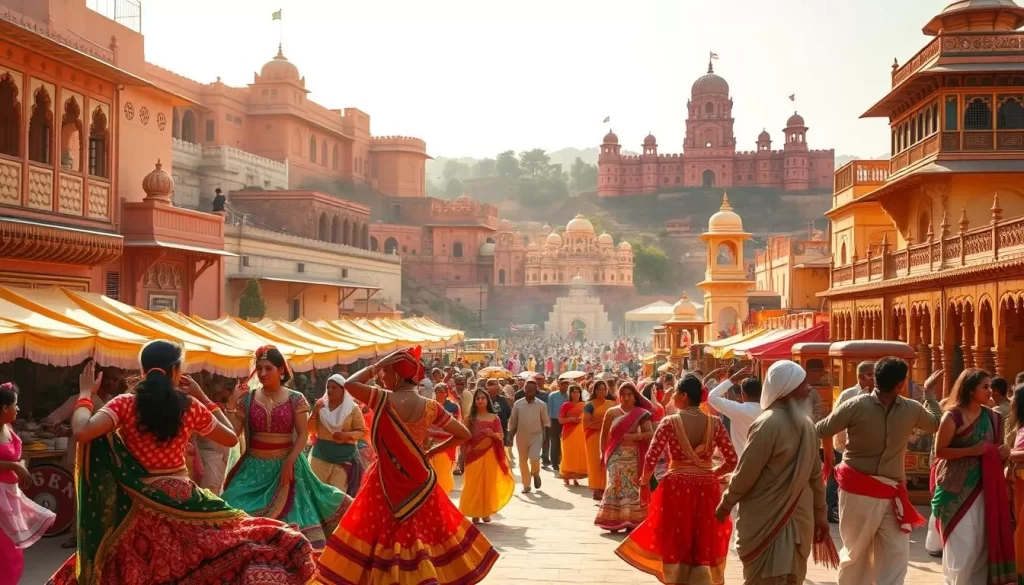
Folk dances like Ghoomar, Kalbeliya, and Terah Taali are integral to Rajasthani festivals, showcasing the region’s artistic heritage. Many of these festivals have religious significance, honoring deities and local folk heroes. The royal heritage of Rajasthan is also prominently displayed, with processions recalling the grandeur of former princely states.
These festivals invite your participation, allowing you to engage with local customs through activities like turban tying and traditional cooking. Each region of Rajasthan celebrates with its unique traditions, making festival hopping across the state an excellent way to experience its diverse cultural landscape.
When to Visit: A Year-Round Festival Calendar
Rajasthan’s festival calendar is as colorful as it is diverse, offering visitors a unique cultural experience regardless of when they visit. The state’s rich heritage is reflected in its numerousfestivals, which take place throughout the year.
Rajasthan hosts a wide range of festivals in every season. The winter months, from October to February, see the highest concentration offestivals, making it an ideal time for festival-focused travel due to the pleasant weather. Some notable winter festivals include the Pushkar Camel Fair in October and the Desert Festival in Jaisalmer, usually held in February.
In the spring, celebrations like theBrij Holi Festivaland theGangaur Festivaloffer insights into Rajasthan’s religious and social traditions. Summer, despite the heat, features special events like theSummer Festivalin Mount Abu, providing a cultural experience in Rajasthan’s only hill station.
The monsoon season brings festivals likeTeej, celebrating the arrival of rains in this largely desert state. Manyfestivalsfollow the lunar calendar, so their dates shift each year according to the Gregorian calendar. It’s wise to verify exact dates before planning your trip.
Some festivals last just a day, while others extend for weeks, allowing you to plan your visit according to your schedule and interests. Whether you’re visiting in January, with events like the Bikaner Camel Festival, or in November, with the Kolayat Fair, there’s always afestivalto experience in Rajasthan.
Desert Festival: Celebrating Life in the Thar

Every February, the golden sands of the Thar Desert transform into a cultural extravaganza during the Desert Festival. This three-day celebration takes place at Sam Sand Dunes, just 42 kilometers from Jaisalmer, and showcases the resilience and creativity of desert communities through music, dance, and traditional competitions.
The Desert Festival features unique desert-specific events like camel races, camel polo, and the famous “Mr. Desert” competition. Folk performances, including Kalbeliya dancers and fire dancers, are the heart of the festival, demonstrating art forms that have evolved over centuries in the harsh desert environment.
Visitors can enjoy the festival from 8:30 am to 9:45 pm over the course of three days. The event culminates under the full moon in February, creating a magical atmosphere. Local artisans also set up stalls selling handcrafted souvenirs, giving visitors the opportunity to purchase authentic Rajasthani handicrafts.
Pushkar Camel Fair: The World’s Largest Camel Festival
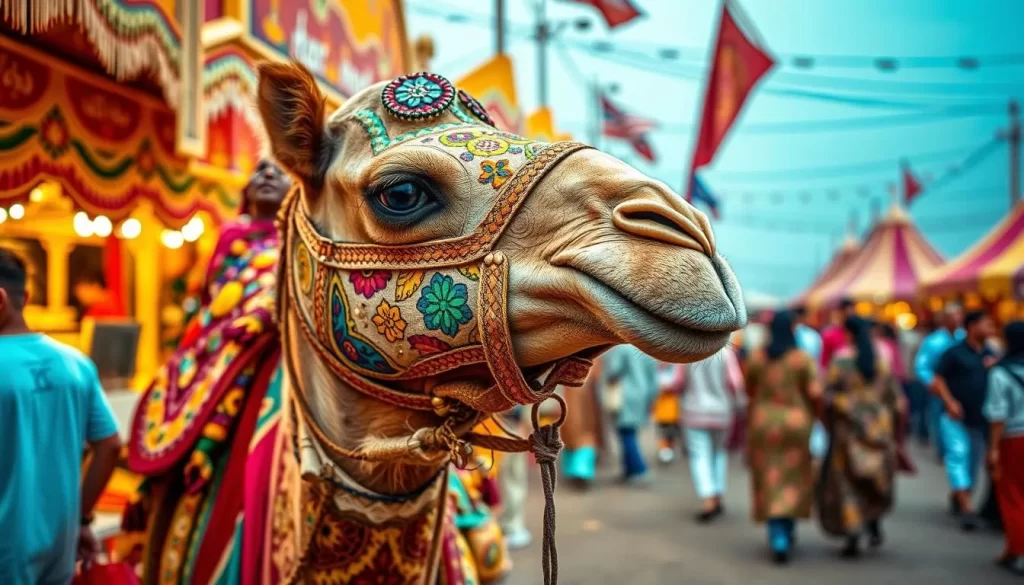
Rajasthan’s rich cultural heritage is on full display at the Pushkar Camel Fair, one of the world’s largest camel trading events. This traditional festival in Rajasthan is a spectacle that attracts thousands of visitors from around the globe.
The Pushkar Camel Fair, held at the Pushkar Fairground, is a celebration that combines commerce, culture, and devotion. It coincides with the religious festival of Kartik Purnima, drawing pilgrims to bathe in Pushkar’s sacred lake. The event features camel beauty contests, camel decoration competitions, and even camel races, showcasing the special bond between Rajasthanis and their camels.
Visitors can enjoy local music, dance performances, and nightly celebrations beside bonfires. The fairgrounds are transformed into a massive open-air market, offering traditional Rajasthani handicrafts, jewelry, and local delicacies, including those made with camel milk. The dates for the Pushkar Camel Fair are from 30th October to 5th November 2025.
Teej Festival: A Celebration of Womanhood and Monsoons
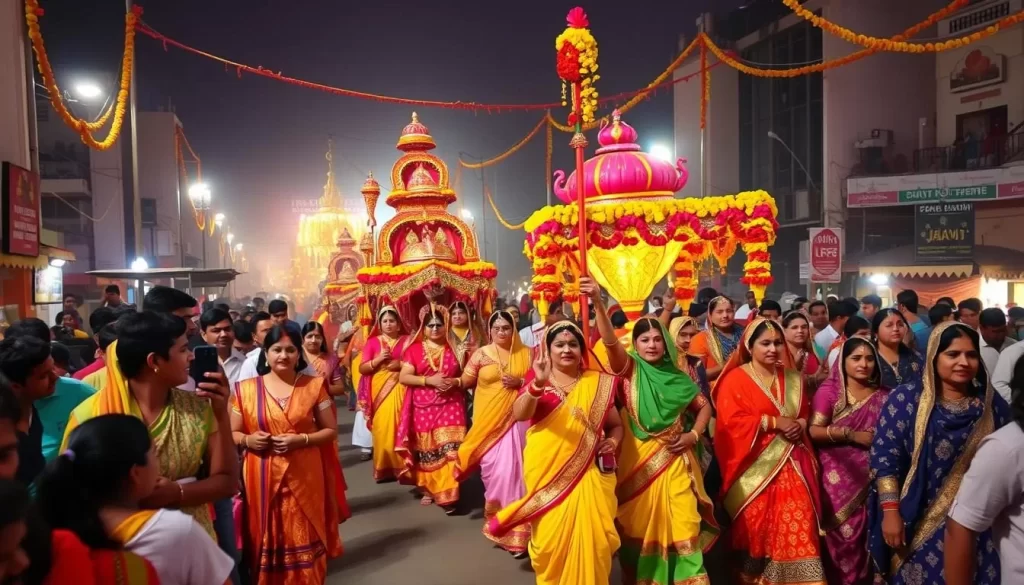
Jaipur’s Teej Festival is a kaleidoscope of colors, music, and devotion, celebrating the essence of marital bliss and the monsoon season. This significant Teej Festival is celebrated with grandeur, featuring traditional songs, dance, fairs, and the worship of Goddess Teej.
Women observe fasting during the festival for the welfare of their husbands, and it’s also a celebration to welcome the monsoon rains that enrich the region. The grand procession features a golden palanquin of Goddess Teej, accompanied by decorated elephants, horses, and camels, making it a unique celebration in the location of Jaipur.
The Teej Festival in Jaipur is marked by women dressing in vibrant green clothing, applying henna, and swinging on decorated swings while singing traditional songs. Traditional sweets like Ghewar and Malpua are key attractions of the festival. Celebrated throughout Rajasthan, Jaipur hosts the most elaborate Teej celebrations, offering an unforgettable cultural experience.
Gangaur Festival: Honoring Marital Bliss
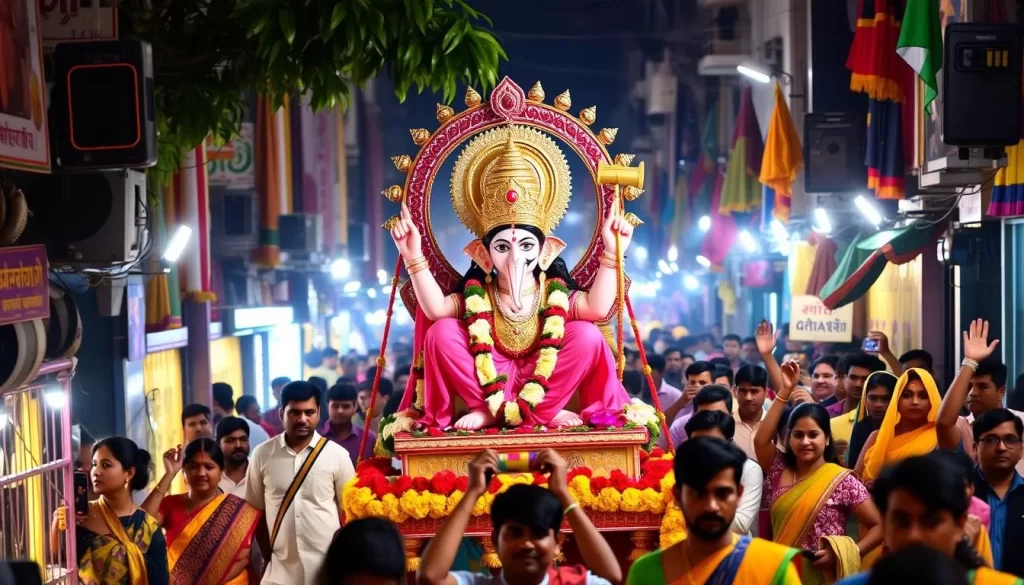
In the vibrant state of Rajasthan, the Gangaur Festival stands out as a joyous celebration of marital bliss. Celebrated over 18 days following Holi, Gangaur is one of Rajasthan’s most important festivals for women, with elaborate celebrations occurring in Jaipur, Udaipur, and Jodhpur.
The name “Gangaur” is derived from “Gan” (Lord Shiva) and “Gaur” (Goddess Parvati), symbolizing the union of these divine consorts and, by extension, marital happiness and fidelity. During the festival, women create small clay images of Gan and Gaur, decorating them with colorful clothes and ornaments, and worship them daily with songs and prayers for marital bliss.
Unmarried women participate in Gangaur to seek blessings for a good husband, while married women pray for the well-being and long life of their spouses, making it a celebration that spans generations. The grand procession on the final day features beautifully adorned images of Goddess Gauri carried through city streets, accompanied by traditional music, dance performances, and decorated elephants and camels.
In Udaipur, the Gangaur celebration coincides with the Mewar Festival, where the procession concludes at Lake Pichola with women ceremonially immersing the images in the water. This festival offers visitors a unique opportunity to witness the rich traditions surrounding marriage in Rajasthani culture.
Jaipur Literature Festival: The Greatest Literary Show on Earth

Imagine a festival that brings together Nobel laureates, Booker Prize winners, and emerging voices in literature. The Jaipur Literature Festival is exactly that – a celebration of literary excellence that attracts visitors from around the globe. Held annually at Hotel Clarks Amer in Jaipur, India, this five-day event transforms the Pink City into a global hub for intellectual discourse, creative expression, and cultural exchange.
The Jaipur Literature Festival has grown significantly since its inception, becoming the world’s largest free literary festival. It draws over 400,000 visitors and features more than 300 speakers annually. The festival’s unique blend of established literary figures and new talent creates a democratic space where literature is accessible to all. You can enjoy a variety of activities, including book releases, seminars, debates, chat shows, and poetry sessions.
Mark your calendars for the Jaipur Literature Festival happening from January 30th to February 3rd, 2025. While entry is free, registration is required, and popular sessions fill quickly. To make the most of your visit, plan your schedule in advance. The festival offers a unique experience centered on ideas, reflecting India’s vibrant contemporary culture alongside international influences.
Rajasthan International Folk Festival (RIFF): A Musical Extravaganza

Experience the magic of Rajasthan’s rich cultural heritage at the Rajasthan International Folk Festival (RIFF) in Jodhpur. Held annually on the Sharad Purnima, the brightest full moon of the year, this festival transforms the magnificent Mehrangarh Fort into a global stage for folk music.
The RIFF is a celebration of traditional folk music and arts, featuring over 200 local and international musicians. The festival takes place at the historic Mehrangarh Fort in Jodhpur, creating a unique atmosphere with its nighttime performances under the moonlight.
Some of the key attractions of the festival include folk music and dance performances, jazz nights, early morning ragas, and interactive sessions. The location of the festival, Mehrangarh Fort, is a 15th-century architectural marvel that adds to the overall experience.
The festival runs for several days, typically from February 1st to February 5th. It is a unique opportunity to experience the rich cultural heritage of Rajasthan and enjoy the company of musicians from around the world at the location of Mehrangarh Fort in Jodhpur.
Elephant Festival: A Royal Celebration

Jaipur’s Elephant Festival is a unique blend of color, joy, and royal tradition, celebrated on the day of Holi. Held at the Jaipur Polo Ground, this vibrant festival showcases elephants adorned with colorful jhools (saddle cloths) and heavy jewelry. The festival is a celebration of the majestic animal that has played a crucial role in Rajasthan’s royal history.
The main attraction is the elephant parade, where these gentle giants are decorated and presented for races, shows, and competitions. Elephant polo matches and tug-of-war contests between elephants are key highlights, showcasing both the animals’ strength and their mahouts’ skills.
Female elephants receive special attention with anklets, floral hairdos, and even nail paint, demonstrating the care and affection Rajasthanis have for these animals. The festival also features folk dancers and musicians performing alongside the elephants, creating a festive atmosphere.
For visitors, the Elephant Festival offers exceptional photography opportunities and a chance to witness a tradition that connects modern Rajasthan with its royal past. The next Elephant Festival is scheduled for 14th March 2025.
Rajasthan, India: Top Festivals to Check Out When Visiting Based on Your Interests
Whether you’re an art enthusiast, a wildlife lover, or an adventure seeker, Rajasthan’s festivals have something for everyone. The state offers a diverse range of celebrations that cater to various interests, making it a vibrant destination for travelers.
For those who appreciate art and culture, the Jaipur Literature Festival and Rajasthan International Folk Festival provide immersive experiences with world-class writers, musicians, and artists in stunning heritage settings. If you’re fascinated by wildlife, the Pushkar Camel Fair, Elephant Festival, and Nagaur Cattle Fair are must-visit events.
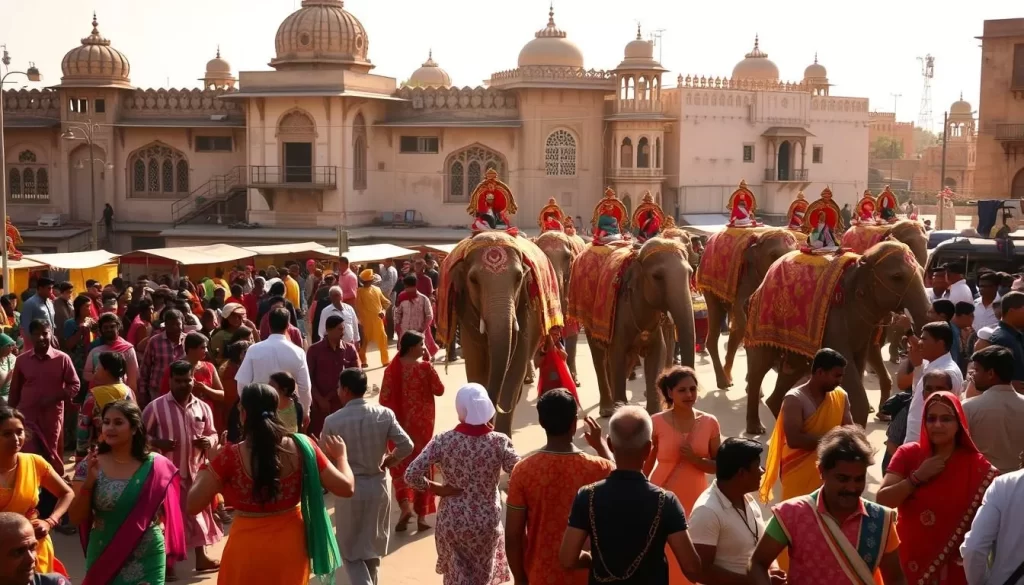
Adventure seekers will enjoy the Kota Adventure Festival, which offers water sports, parasailing, and trekking experiences along the Chambal River. Meanwhile, those interested in royal heritage can witness the grandeur of Rajasthan’s princely past at the Mewar Festival in Udaipur and the Kumbhalgarh Festival. With so many festivals to choose from, you can plan your visit to Rajasthan based on your interests and make the most of your days in this incredible location.
Kota Adventure Festival: For the Thrill Seekers

If you’re an adventure lover, the Kota Adventure Festival is an event you won’t want to miss. Located by the serene Kishore Sagar Talab and the majestic Chambal River in Kota, this festival transforms the city into a thrilling adventure hub.
The Kota Adventure Festival showcases a wide range of activities, including parasailing, rafting, windsurfing, water skiing, kayaking, rock climbing, trekking, gliding, and fishing. These activities cater to both amateurs and professionals, making it a diverse and exciting event.
Set along the banks of the Chambal River, the festival’s water sports are a major highlight, offering opportunities to try rafting, parasailing, and windsurfing in the river. Land-based adventures include rock climbing and trekking, allowing visitors to explore Kota’s unique landscape.
The Kota Adventure Festival typically includes competitions and evening cultural programs featuring folk performances that showcase the Hadoti region’s cultural traditions. For travelers seeking an active vacation in Rajasthan, this festival provides a perfect opportunity to experience the state’s natural landscapes in an exciting way.
Mewar Festival: Celebrating the Arrival of Spring

Udaipur’s Mewar Festival is a spectacular event that heralds the onset of spring with grandeur. As you experience this vibrant celebration, you’ll be surrounded by the rich cultural heritage of Rajasthan. The festival is celebrated over two days, typically on March 31st and April 1st, as seen in the 2025 schedule.
The Mewar Festival coincides with Gangaur in Udaipur, creating one of Rajasthan’s most visually stunning celebrations. The “City of Lakes” comes alive with color and festivities to welcome spring. You can witness women dressed in their finest traditional attire, carrying images of Goddess Gauri in a procession through Udaipur’s winding streets toward Lake Pichola.
The festival culminates in a beautiful boat procession on Lake Pichola, where women place the images of Isar (Lord Shiva) and Gangaur (Goddess Parvati) into the lake waters at sunset. You can enjoy cultural performances at Gangaur Ghat and other venues, showcasing the rich heritage of the Mewar region through folk dances, music, and theatrical performances.
For you, the Mewar Festival offers a perfect opportunity to experience Udaipur’s beauty enhanced by cultural celebrations, with the lake, palaces, and mountains providing a spectacular backdrop. You can explore local markets featuring special Gangaur dolls, traditional Rajasthani handicrafts, and seasonal foods, making it an excellent time for shopping and culinary exploration.
Winter and Summer Festivals of Mount Abu
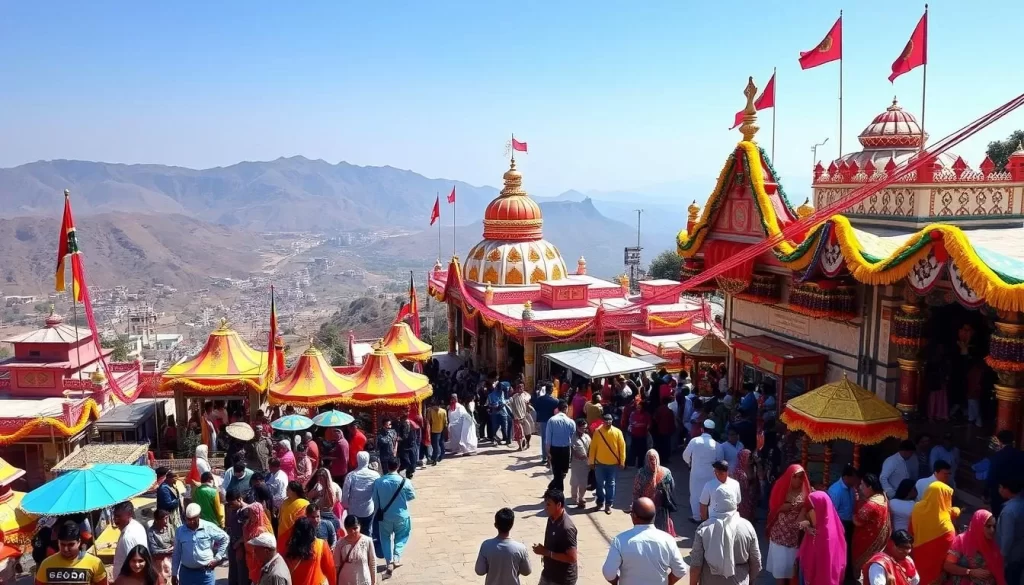
Experience the rich heritage of Rajasthan at Mount Abu’s Summer and Winter Festivals. These two major festivals, held annually, offer a unique glimpse into the region’s culture and traditions. The Summer Festival, coinciding with Buddha Purnima in May, features vibrant cultural performances against the lush green backdrop of Mount Abu.
The Winter Festival, on the other hand, takes advantage of Mount Abu’s crisp winter climate, with events centered around Nakki Lake and the Polo Ground. Both festivals are celebrated over several days, typically 3 days for the Winter Festival, which is scheduled from 2nd Jan 2025 to 4th Jan 2025.
Key attractions include boat races on Nakki Lake, traditional Rajasthani folk dances like Ghoomar and Gair, and competitions in skating, horse racing, and tug-of-war. Evening activities feature Sham-e-Qawwali (Sufi music performances), poetry sessions, and spectacular fireworks displays. The festivals are designed to promote tourism, making them visitor-friendly with well-organized programs, local cuisine, and handicraft markets.
Lesser-Known Gems: Unique Festivals Worth Discovering
While many flock to Rajasthan’s famous festivals, there are numerous hidden gems waiting to be discovered. These lesser-known celebrations offer authentic cultural experiences without the crowds, giving travelers unique insights into local traditions.
The Baneshwar Festival in Dungarpur is a significant tribal fair where Bhil communities gather to worship Lord Shiva at the confluence of the Som and Mahi rivers. Another unique experience is Brij Holi in Bharatpur, which emphasizes Lord Krishna traditions, including Raslila performances.
- The Kolayat Fair near Bikaner combines spiritual rituals with a cattle fair.
- The Chandrabhaga Fair in Jhalawar is a religious gathering and cattle trading event.
- The Marwar Festival in Jodhpur celebrates Rajasthan’s heroes through folk music and dance.
- The Abhaneri Festival near Jaipur showcases cultural heritage around the Chand Baori stepwell.
| Festival | Location | Description |
|---|---|---|
| Baneshwar Festival | Dungarpur | Tribal fair dedicated to Lord Shiva |
| Brij Holi | Bharatpur | Celebration of Lord Krishna traditions |
| Kolayat Fair | Near Bikaner | Spiritual rituals and cattle fair |

These unique festivals in Rajasthan provide a deeper understanding of the state’s rich cultural tapestry. By attending these events, you can experience the authentic spirit of Rajasthan’s festival celebrations.
Practical Tips for Festival-Goers in Rajasthan
As you prepare to experience the vibrant festivals of Rajasthan, here are some practical tips to enhance your visit.
When attending major festivals like the Pushkar Camel Fair or Jaipur Literature Festival, it’s crucial to plan your visit well in advance. Accommodations fill up quickly, and prices surge during these events.
To ensure a comfortable experience, dress modestly and appropriately for the weather. Lightweight clothing that covers your shoulders and knees is recommended, with layers for cooler evenings. Don’t forget essentials like a hat, sunscreen, water bottle, and comfortable shoes, as you’ll likely spend long periods outdoors.
Researching the festival schedule beforehand is also vital, as activities vary across different days. Consider hiring a local guide to provide cultural context and help navigate crowded venues.
| Festival | Best Time to Visit | Essential Items to Carry |
|---|---|---|
| Pushkar Camel Fair | November | Warm clothing, comfortable shoes |
| Jaipur Literature Festival | January | Light jacket, sunscreen |
| Desert Festival | February | Lightweight clothing, hat |
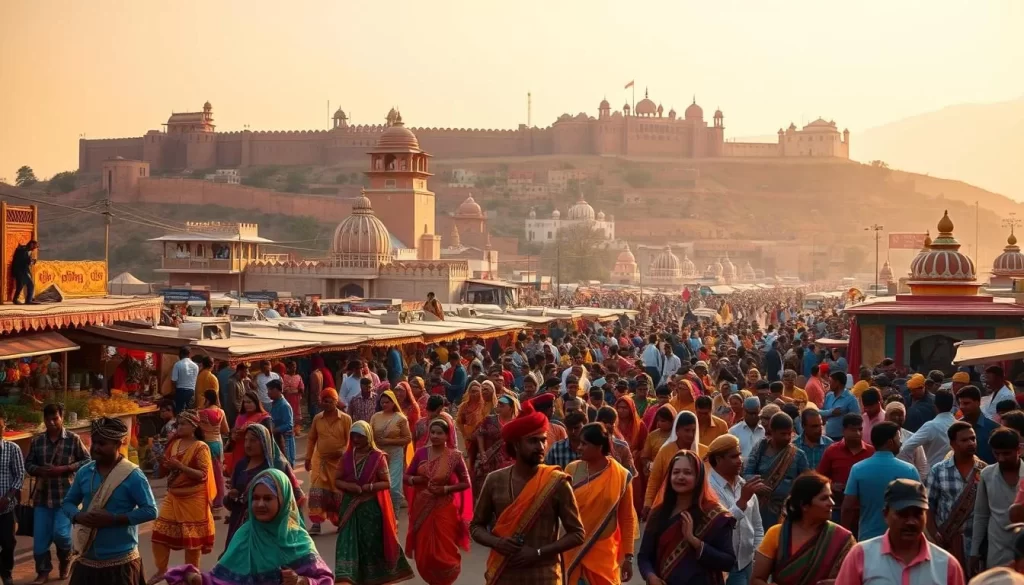
Be respectful of local customs and traditions, especially at festivals with spiritual significance. Prepare for large crowds by keeping valuables secure and staying hydrated. Booking transportation in advance is also advisable, as public transport can be scarce during major festivals.
By following these tips, you’ll be well-prepared to enjoy the diverse and vibrantfestivals of Rajasthan.
Conclusion: Experiencing the Heart of Rajasthan Through Its Festivals
The colorful festivals of Rajasthan provide an immersive experience, revealing the state’s soul. As you’ve seen, the state’s festival calendar is packed with events that showcase its rich cultural heritage, from the Gangaur Festival to the Rajasthan International Folk Festival.
Each festival in Rajasthan tells a unique story about the state’s relationship with its environment and its people. Whether it’s the celebration of monsoon rains during Teej or the showcasing of desert life at the Jaisalmer Desert Festival, every event offers a distinct cultural experience.
By participating in these festivals, you’ll connect with Rajasthan’s people and witness the state’s living traditions. The diversity of festivals reflects Rajasthan’s complex cultural tapestry, offering something for everyone, from literary discussions to folk dances and adventure sports.
Timing your visit to coincide with one of these festivals will transform your Rajasthan experience, immersing you in its living, breathing cultural present. With its rich cultural heritage and vibrant festival scene, Rajasthan is a destination that will leave you with lasting memories.
The above is subject to change.
Check back often to TRAVEL.COM for the latest travel tips and deals.
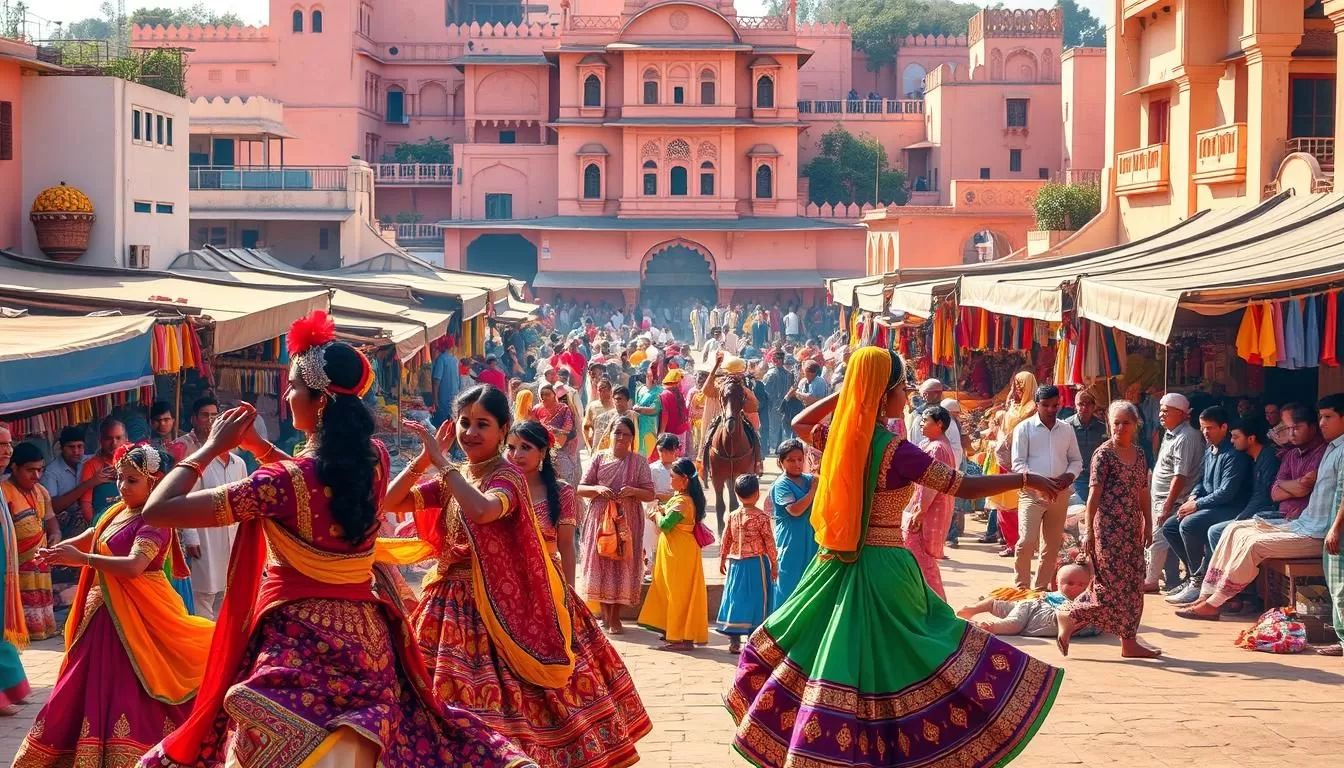

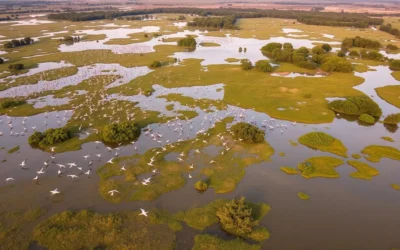

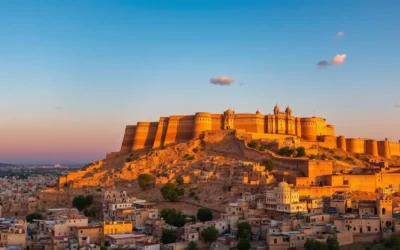
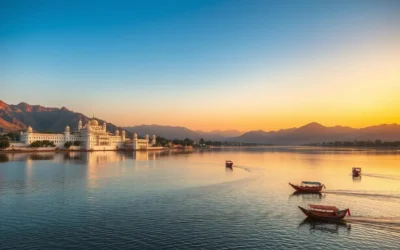
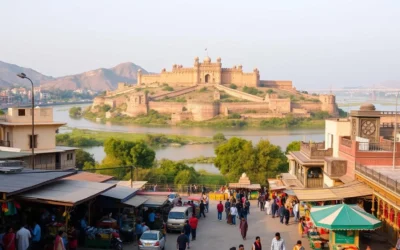
0 Comments